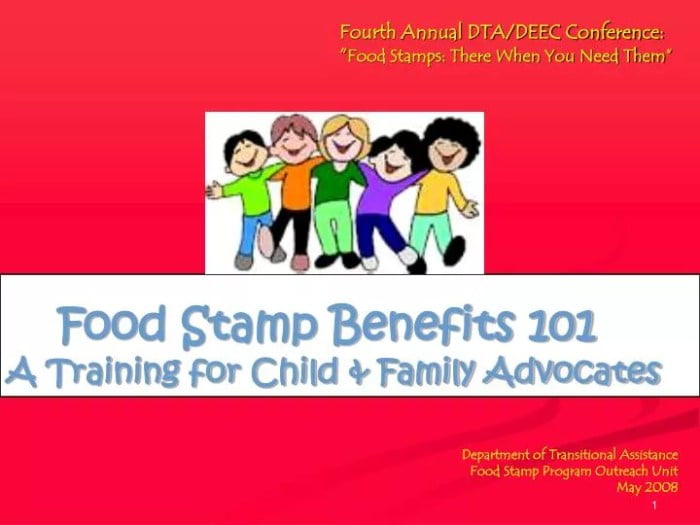Homeschooling is becoming increasingly popular as parents seek more control over their children’s education. However, many families wonder if homeschooling will affect their eligibility for food stamps. This article will explore the impact of homeschooling on food stamp eligibility and provide information on alternative support programs available to homeschooling families.
To determine eligibility for food stamps, the government considers factors such as income, assets, and household size. Homeschooling can impact these factors, so it’s important to understand how.
Eligibility for Food Stamps

To be eligible for food stamps, households must meet certain income and asset limits. The income limit is based on the household’s size and composition, and the asset limit is based on the household’s total value of assets, excluding a home and one vehicle.
Homeschooling families may have different income and asset levels than other families. For example, homeschooling families may have one parent who stays home to homeschool the children, which can reduce the household’s income. Additionally, homeschooling families may have higher expenses for educational materials and activities, which can reduce the household’s assets.
Impact of Homeschooling on Household Income
The impact of homeschooling on household income can vary depending on the family’s circumstances. In some cases, homeschooling can lead to a decrease in household income. For example, if one parent stays home to homeschool the children, the family may lose one source of income.
Additionally, homeschooling families may have higher expenses for educational materials and activities, which can further reduce the household’s income.
However, in other cases, homeschooling can lead to an increase in household income. For example, if the parent who stays home to homeschool the children is able to start a home-based business, the family may be able to increase its income.
Additionally, homeschooling families may be able to save money on childcare expenses, which can also increase the household’s income.
Changes in Income and Expenses
Homeschooling can significantly impact family income and expenses, affecting food stamp eligibility.
Income
Homeschooling may lead to reduced income for families where one parent leaves employment to facilitate education. Additionally, homeschooling parents may face limitations in seeking employment due to scheduling conflicts or the need to supervise children during school hours.
Expenses
Homeschooling incurs expenses that may not be present in traditional schooling. These expenses include:
-
-*Curriculum materials
Textbooks, workbooks, and other educational resources can be costly.
-*Tutoring
Additional support from tutors may be necessary, especially for subjects like math and science.
-*Extracurricular activities
Homeschooling families often participate in extracurricular activities to supplement academic learning, such as sports, music lessons, or clubs, which can add to expenses.
Impact on Food Stamp Eligibility
Changes in income and expenses due to homeschooling can impact food stamp eligibility.
Reduced income may lower the household’s gross income, making them eligible for food stamps. However, increased expenses associated with homeschooling may offset the reduction in income, potentially reducing food stamp benefits.
Verification of Homeschooling Status
To determine eligibility for food stamps, it is essential to verify homeschooling status. This verification process helps ensure that only eligible households receive benefits.
Documentation Required
To prove homeschooling status, the following documentation may be required:
- Letter from a school district official: This letter should confirm that the child is not enrolled in public or private school and is receiving homeschooling.
- Curriculum and lesson plans: These documents should Artikel the educational materials and activities used for homeschooling.
- Records of attendance: This may include a logbook or portfolio that tracks the child’s daily learning activities.
Challenges in Verification
Verifying homeschooling status can pose certain challenges, including:
- Lack of standardized regulations: Homeschooling laws and regulations vary from state to state, making it challenging to establish uniform verification criteria.
- Limited oversight: Homeschooled children may not have the same level of oversight as children in traditional schools, making it harder to assess their educational progress.
- Potential for fraud: Some individuals may attempt to falsely claim homeschooling status to obtain benefits they are not eligible for.
State and Local Variations

Food stamp policies related to homeschooling vary across different states and localities. Some states have specific provisions for homeschooling families, while others do not. These variations can impact food stamp eligibility.
For example, some states may consider homeschooling families as unemployed, which can affect their eligibility for food stamps. Other states may have income limits that are higher for homeschooling families, making it easier for them to qualify for food stamps.
Impact of Variations
The impact of these variations can be significant. Homeschooling families in states with more restrictive policies may have difficulty accessing food stamps, even if they are in need. This can lead to food insecurity and other financial hardships.
Alternative Support Programs

Homeschooling families may qualify for alternative support programs that provide financial assistance, food, or other resources. These programs can supplement food stamps or offer additional support to meet the unique needs of homeschooling families.
One common alternative support program is the Special Supplemental Nutrition Program for Women, Infants, and Children (WIC). WIC provides nutritional assistance to low-income pregnant, postpartum, and breastfeeding women, as well as infants and children under the age of 5. WIC benefits include vouchers for healthy foods, nutrition education, and breastfeeding support.
Supplemental Nutrition Assistance Program (SNAP)
SNAP, formerly known as food stamps, is a federal program that provides monthly benefits to low-income individuals and families to purchase food. To be eligible for SNAP, households must meet certain income and asset limits. Homeschooling families may be eligible for SNAP benefits if their income falls below the federal poverty level.
Temporary Assistance for Needy Families (TANF)
TANF is a federal program that provides temporary financial assistance to low-income families with children. TANF benefits can be used to cover a variety of expenses, including food, housing, and childcare. Homeschooling families may be eligible for TANF benefits if they meet the income and other eligibility requirements.
Final Conclusion
In conclusion, the impact of homeschooling on food stamp eligibility varies depending on individual circumstances and state regulations. It’s crucial for homeschooling families to carefully review the eligibility criteria and provide accurate information to ensure they receive the support they need.
By exploring alternative support programs, homeschooling families can supplement food stamps or access additional resources to meet their nutritional needs.
FAQ
Does homeschooling count as income?
No, homeschooling itself is not considered income for food stamp purposes.
How does homeschooling affect household income?
Homeschooling can potentially reduce household income if one parent leaves their job to homeschool full-time.
What expenses can be associated with homeschooling?
Homeschooling expenses may include curriculum materials, tutoring, extracurricular activities, and educational software.
How is homeschooling status verified for food stamps?
Homeschooling status is typically verified through documentation from the local school district or state education agency.
Are there any alternative support programs for homeschooling families?
Yes, there are various programs such as TANF, WIC, and Head Start that provide financial assistance and support services to low-income families, including homeschooling families.